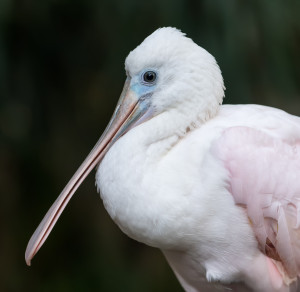 During the winter season, Florida can look like a scene out of Jurassic Park. The sheer scale and variety of birds flocking down here is a sight to be seen. Hundreds of birds of varying species stand side by side bodies of water and make the area their home for the winter/nesting season. One bird that can be spotted in southern Florida is the roseate spoonbill, and it happens to be a threatened species.
During the winter season, Florida can look like a scene out of Jurassic Park. The sheer scale and variety of birds flocking down here is a sight to be seen. Hundreds of birds of varying species stand side by side bodies of water and make the area their home for the winter/nesting season. One bird that can be spotted in southern Florida is the roseate spoonbill, and it happens to be a threatened species.
The roseate spoonbill is the only spoonbill native to the Western Hemisphere. They are white and brightly pink colored (like a flamingo) do to the carotenoid pigment canthaxanthin in their diets. Depending on their age, roseate spoonbills can be a pale pink or a deep, bright magenta in color. They have a gray spoon-shaped bill, white neck, back, and breast. They are 28-34 inches in size with a wingspan up to 52 inches.
To catch its prey, the spoonbill swinging its spoon-shaped bill back and forth in shallow waters. They eat crayfish, shrimp, crabs, frogs, newts, and small fish. They often travel and feed in groups. Its bill allows it to sift through mud to find food sources, as well.
They are considered to be a social bird who lives in a large colony with other birds like herons, storks, and egrets. They fly in flocks in a long, diagonal line.
When breeding, they will next in mangrove or trees, but they usually stay by the coast. Female spoonbills build the nest while the male provides the materials for the females to build. They can lay up to 3 eggs at a time.
In the mid-1800s, the roseate spoonbill was hunted for its feathers; they were used to make women’s hats and fans, but this practice is now illegal; the population has begun to grow since this regulation was put in place. In the early 20th century, there was only a few dozen pairs left. They were made a protected species in the 1940s. This bird is also threatened by habitat loss, pesticides, illegal shootings, and lower food sources. To protect this bird, it was named under the U.S. Migratory Bird Treaty Act to be protected and it is recognized as a state-designed threatened species.
In 2006, a tagged roseate spoonbill was seen; it was 16 years old, which made it the oldest wildest known spoonbill of its kind.
Want to catch a glimpse of the roseate spoonbill in the Everglades, along with many other birds? To get a great views of the skies and bodies of water (where birds will be) in the Everglades, you should opt for an airboat tour. An airboat ride can bring you to places in the Everglades not accessible by foot. To book a trip, contact Captain Mitch’s Airboat Tours at 800-368-0065 or click here






